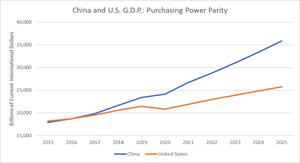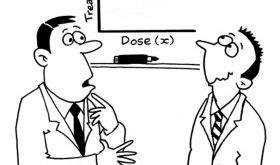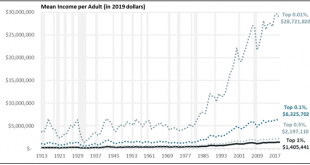from Asad Zaman Brief History of Econometrics: Launched in early 20th Century by Ragnar Frisch, econometric methodology was strongly shaped by the Cowles Commission (CC) in the 1960’s. The CC approach relied on structural equations, which embodied causal information known in advanced to the researcher. The goal was estimation of causal effects, and not discovery or assessment of the hypothesized causal structures. The oil shock of the 1970’s led to dramatic failures of macroeconomic...
Read More »China and U.S. GDP: Purchasing Power Parity – chart
Source: International Monetary Fund. “As the chart shows, China’s economy first passed the U.S. in 2017. It is projected to be more than 16 percent larger this year, and by 2025 is projected to be almost 40 percent larger by 2025.” Dean Baker
Read More »Fat Boy 114 Sound
Hunting for causes (wonkish)
from Lars Syll There are three fundamental differences between statistical and causal assumptions. First, statistical assumptions, even untested, are testable in principle, given sufficiently large sample and sufficiently fine measurements. Causal assumptions, in contrast, cannot be verified even in principle, unless one resorts to experimental control. This difference is especially accentuated in Bayesian analysis. Though the priors that Bayesians commonly assign to statistical...
Read More »Financial transactions taxes: The perfect way to pay for Biden’s infrastructure package
from Dean Baker There has been a lot of silliness around President Biden’s proposed infrastructure packages and the extent to which they are affordable for the country. First and foremost, there has been tremendous confusion about the size of the package. This is because the media have engaged in a feast of really big numbers, where they give us the size of the package with no context whatsoever, leaving their audience almost completely ignorant about the actual cost. We have been told...
Read More »Neoliberal economists announce . . .
from Ken Zimmerman (originally a comment) Neoliberal economists announce to all, whether they want to hear it or not regularly, those who are wealthy and powerful deserve both, and more due to their greater intelligence, commitment, foresight, and competitive spirit. They deny that prejudices of any kind, racial, ethnic, gender, political, etc. play any part in such determinations. Referencing to the old Grouhcho Marx’s joke, these economists want us to believe their theory rather than...
Read More »USA income redistribution in top one percent 1913 to 2019
Source: https://crsreports.congress.gov/product/pdf/R/R44705/6
Read More »Hunting for causes (wonkish)
from Lars Syll There are three fundamental differences between statistical and causal assumptions. First, statistical assumptions, even untested, are testable in principle, given sufficiently large sample and sufficiently fine measurements. Causal assumptions, in contrast, cannot be verified even in principle, unless one resorts to experimental control. This difference is especially accentuated in Bayesian analysis. Though the priors that Bayesians commonly assign to statistical...
Read More »Harley Davidson Fat Boy 114 Indoor Projects
May 1st brought wet weather so I worked on my new additions in the garage today. Mustache engine guard and the Holdfast system with the Sissy Bar and Luggage Rack.
Read More »Covid-19 in India – profits before people
from Jayati Ghosh The unfolding pandemic horror in India has many causes. These include the complacency, inaction and irresponsibility of government leaders, even when it was evident for several months that a fresh wave of infections of new mutant variants threatened the population. Continued massive election rallies, many addressed by the prime minister, Narendra Modi, brought large numbers to congested gatherings and lulled many into underplaying the threat of infection. The...
Read More » Real-World Economics Review
Real-World Economics Review





